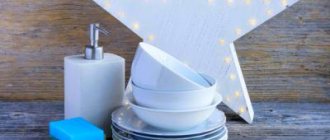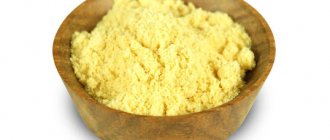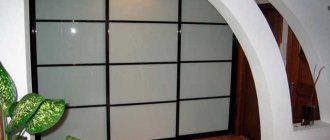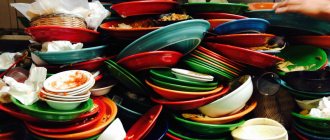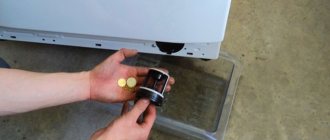Every housewife has cups and plates made of ordinary glass, as well as pots and baking trays made of heat-resistant glass. Glass is a versatile, but rather capricious material. To maintain an ideal appearance, dishes made from it need careful care. Many housewives face the problem of how to wash glassware until it shines without damaging its surface. And it often turns out that dishwashing liquid is not enough to effectively remove limescale and grease.
We fight limescale using folk remedies
Baking soda
This method is simple and does not require the use of any complex means. To easily remove stains from glass, sprinkle a little baking soda on a dish sponge. Wipe wet glassware with it, then rinse thoroughly under running water. Unpleasant stains and drops will disappear without a trace!
Vinegar solution
Regular table vinegar diluted in water at room temperature (1 tablespoon of vinegar per glass of water) can also help deal with various marks on the surface of glassware. The solution should be used to wipe trays, jars or salad bowls after thorough washing. It is most convenient to use a spray bottle during the process. If your household does not have it, wet gauze or a piece of cloth with the solution. Wipe the glass thoroughly. You will immediately see how it becomes transparent and shiny. Just remember to rinse the glassware with cool water and wipe dry with a kitchen towel.
Ammonia
Regular ammonia can also help solve the problem at home. You need to pour a small amount of it onto the fabric, then rub it into the surface of the dish with rhythmic movements. After this procedure, all surfaces will sparkle like new!
Lemon liquid
A solution prepared with lemon is no less effective. In a glass of warm water you need to dissolve 20 g of citric acid (usually this is the weight contained in the bag). Now all that remains is to apply the resulting liquid to the glass, wait 10 minutes, and then thoroughly clean the dishes and wash with cool water.
By the way, these home remedies for limescale are great for more than just dishes. They will perfectly clean any glass, ceramic, earthenware or mirror surface in the house. The main thing to remember is that the soda cleaning method is not suitable for fragile porcelain items. This is due to the fact that abrasive particles can damage the surface.
Why does glass become cloudy?
There are many reasons for the aging of the glass surface. One of them is associated with the use of too aggressive detergents. Negative factors include increased water hardness, high temperature of the washing liquid, as well as physical friction when dishes are placed too closely together.
Therefore, to avoid aging and clouding, use gentle cleaning compounds, do not place items close together, especially when washing in the dishwasher, and use different filters or other methods to soften the water.
The quality of tableware production plays an important role in the rate of glass aging. The presence of a large number of microcracks on the surface, which we cannot see with the eye, will eventually cause the development of glass corrosion and corrosion of the material under the influence of alkali. Such damage is already irreversible, and such defects can only be dealt with at the initial stage.
To keep glass appliances in their original form, it is important to properly care for the products. Let's look at how to wash glassware without streaks so that it sparkles and shines.
Removing carbon deposits and greasy stains from glass baking dishes
Any glassware for the oven sooner or later becomes dirty and acquires a non-specific brownish color. Spots of burnt fat appear on its surface, which are not so easy and quick to remove. Moreover, the appearance of contamination occurs regardless of whether your glassware is inexpensive or elite.
Drops of dried fat are much more difficult to deal with than removing limescale deposits formed from water. Therefore, you will have to resort to stronger and more complex means. But you can also prepare the compositions yourself.
Composition with laundry soap
Not every housewife knows how to clean glassware from grease using laundry soap. Although this is a very old and very effective method that was used by previous generations. The method definitely deserves attention today. Laundry soap will help eliminate grease stains of any kind, even the most old ones.
Components:
- laundry soap 72% - 0.5 - 1 pc. (depending on the size of the dishes);
- pure water.
- Using a grater or a sharp knife, you need to make soap shavings and pour them into the dishes that will be cleaned.
- Fill with water so that it does not reach 4-5 centimeters from the upper border of the mold or tray. Place in the oven and preheat the device to 180 degrees. When the contents of the dish boil, the temperature must be reduced.
- Now it is important to let the soap solution simmer for half an hour.
- Then leave the mixture in the oven until it cools completely.
- Only after this can the solution be disposed of and the dishes cleaned with a hard sponge.
Solution with citric acid and vinegar
Thanks to the active substances contained in the well-known lemon and vinegar, the solution is quite powerful. If you don’t know how to clean glassware from carbon deposits and grease, try this one. The method is quite simple and quick to implement. It does not require any expensive components.
Components:
- clean water – 1 l;
- table vinegar - 0.5 tbsp.;
- citric acid – 1 tbsp. l.
- The required amount of water must be brought to a boil.
- Next, dissolve vinegar and a spoonful of citric acid in boiling water.
- Soak the tray or baking dish that has oven residue and frozen drops of fat in the resulting solution.
- Leave for 1 hour.
- Then you need to clean the glass surfaces with a stiff brush or brush.
Mustard powder remedy
This effective method will help get rid of even the oldest grease on glassware. In combination with hot water, mustard works real miracles! To see this from your own experience, just try it. The method is simple and absolutely safe.
Components:
- hot water – 2 l;
- mustard powder – 100 g.
- Mustard powder must be dissolved in hot water.
- Then you should soak the greasy dishes in the resulting solution.
- Soak the molds and trays in the liquid for 30 minutes or a little more.
- Use the hard side of the sponge to clean off dirt and then rinse thoroughly.
A mixture of PVA glue and laundry soap
This method is suitable for removing carbon deposits from both the outside and inside of dishes. The main thing to remember is that after such cleaning, the molds, pots and trays need to be rinsed well with clean water. The method is very effective, not difficult to implement and quite affordable. Thanks to this, many housewives will like it.
Components:
- clean water – 3.5-4 l;
- laundry soap 72% - 1 pc.;
- PVA glue – 1 tbsp. l.
- Pour the required amount of clean liquid into a large container.
- Next, chop the bar of soap into small pieces and place it in water.
- Add a tablespoon of PVA glue there.
- Place contaminated glassware into the solution.
- Boil it for 30 minutes.
- Clean dishes using the hard side of the sponge.
Not only heat-resistant glassware can be cleaned this way. The presented methods are perfect for any metal frying pans and pots. The main thing is not to use abrasive substances when washing non-stick cookware. Otherwise, the pans will be damaged and unsuitable for further use.
If all traditional methods have been used, but the dishes are far from ideal cleanliness, it’s time to resort to using household chemicals. To choose the right product, you should use several tips.
Author block
Glassware is an essential utensil in every kitchen. In recent decades, glass products have gained particular popularity. It is practical, beautiful and convenient.
However, all the pros are outweighed by one big minus - over time, glass plates, salad bowls and vases lose their original appearance. They don't shine like they used to and no longer provide aesthetic pleasure.
This is due to plaque that accumulates during use. To clean glassware, stores offer a lot of household chemical products, but not all housewives use advertised products. Besides, the chemicals are harmful. In this case, proven home remedies will help clean the glass.
What household products should I use to wash dishes?
- Only those products that are specifically designed for this purpose are suitable for this purpose. Usually there are special inscriptions on their labels. For example, “for washing dishes” or something similar.
- You should choose a product with the largest amount of surfactants (surfactants). They are responsible for foaming and the greater their number, the better the product will lather. Accordingly, it will be possible to wash many more dishes.
- If you do not use rubber gloves when washing dishes, be sure to pay attention to an indicator such as pH. Ideally it should be 5.5. This number corresponds to the pH of human skin.
- It is worth giving preference to products that contain protective components for the skin of the hands - silicone or glycerin. They form a protective film on the skin, which prevents the active substances of the detergent from penetrating deep into the skin. This is worth remembering for those who are not used to using rubber gloves.
Precautions when using household chemicals
Every housewife should understand how important it is to follow safety precautions and precautions when using aggressive chemicals. After all, with the wrong approach, there is a high risk of harming your well-being or the health of your household.
- When washing dishes, be sure to use high-quality rubber gloves. They should not contain any breaks on their surface through which chemicals can get onto the skin of the hands.
- It is also necessary to pay attention to the expiration date of the purchased product. If it has already expired, then you should no longer use the substance.
- Do not use household chemicals in the presence of young children. It is also important not to leave bottles within a child’s reach, especially with open caps.
- After using household chemicals, it is important to thoroughly rinse the dishes with clean running water. Otherwise, the active substances will enter the digestive tract during food intake. This can cause allergies or even poisoning.
- Dishwashing detergents, like any other household chemicals, should be stored away from food products.
To keep glass jars and baking trays looking clean and shiny, it is important to care for them properly. Timely washing and cleaning with high-quality home or store-bought products will help achieve success. If you don’t know how to clean glassware from limescale or remove drops of old grease on glass surfaces, then use the products presented in this article.
Share the article on social media. networks:
Important subtleties
Regardless of which of the proposed methods you choose, be sure to follow these precautions - they will help you clean your crystal safely and quickly without damaging the sensitive material:
- Never allow crystal to come into contact with high temperatures. The washing liquid should be at room temperature, approximately 30-35 degrees, otherwise the products may become cloudy.
- Do not leave the crystal to dry on its own - the remaining stains after such drying are extremely difficult to polish. It is better to wipe the products immediately after cleaning, before they have had time to dry, with a soft, lint-free cloth made from natural fabrics.
- While any suggested means are suitable for crystal tableware, it is better not to wash glass chandeliers using any soap solutions - after drying, the soap creates an invisible film, which, when heated under the influence of lamps, can cause yellowing and microcracks to appear on the interior item.
By following these simple rules, you can easily and quickly update the crystal in your home, giving it a festive glow and perfect cleanliness!
I like 1
Crystal Clean crystal Washing crystal Clean Cleaning products Washing Washing dishes Detergents
Related Posts
leave a comment
Only 1 comment.




